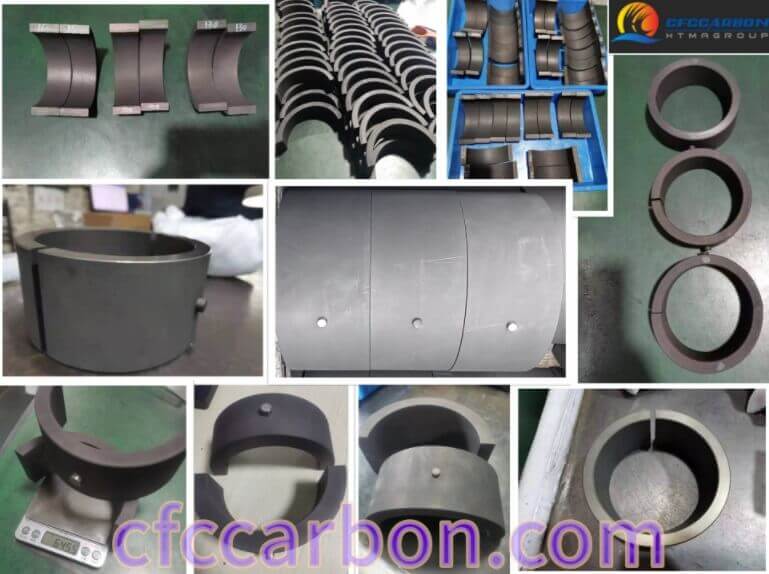Introduction to Mechanical Carbon
Mechanical carbon, also known as carbon-graphite material, is a specialized engineering material widely used in mechanical seals, bearings, and other high-performance applications. It is composed of carbon or graphite combined with various binders and additives to enhance its mechanical and thermal properties. Mechanical carbon can be classified into several types, including resin-bonded carbon, metal-impregnated carbon, and electrographite, each tailored for specific industrial needs. Key properties include excellent self-lubrication, high thermal conductivity, chemical resistance, and superior wear resistance. With advancements in material science, the development of high-temperature and high-strength carbon materials, such as silver graphite (M120G), is driving innovation in mechanical sealing technology.
Production Process of Mechanical Carbon

resin,copper,antimony,impregnated,mechanical,seal,bearings,carbon,graphite,material,manufacturer,factory,China(s)
The manufacturing process of mechanical carbon involves several critical steps to ensure optimal performance. First, raw materials such as natural graphite, petroleum coke, or carbon black are mixed with binders (e.g., phenolic resin or pitch). The mixture is then molded under high pressure to form the desired shape. Next, the green product undergoes a baking process at high temperatures (up to 1000°C) to carbonize the binder. For enhanced properties, some materials undergo graphitization at temperatures exceeding 2500°C. Additional treatments, such as impregnation with metals (antimony, copper) or resins, may be applied to improve density, strength, and thermal resistance. The precision machining of mechanical carbon components ensures tight tolerances for sealing applications.
Properties of Silver Graphite (M120G)
Silver graphite, designated as M120G, is a high-performance mechanical seal material known for its exceptional thermal and mechanical properties. This material is reinforced with aluminum phosphate, which significantly enhances its high-temperature stability and wear resistance. Key characteristics include:
- High-Temperature Resistance: M120G can withstand extreme temperatures (up to 500°C in oxidizing environments and even higher in inert conditions), making it ideal for demanding applications such as pumps, compressors, and aerospace systems.
- Excellent Wear Resistance: The incorporation of aluminum phosphate improves hardness and reduces friction, extending the lifespan of mechanical seals.
- Chemical Inertness: Resistant to corrosive media, including acids and alkalis, ensuring reliability in harsh industrial environments.
- Low Thermal Expansion: Ensures dimensional stability under thermal cycling, preventing seal failure.
-
Type Grade name Resin type Shore hardness Bending strength Compressive strength Open porosity Bulk density C.T.E Max.temp ≥ ≥MPa ≥MPa ≤% g/cm3 10-6/℃ ℃ Silver M120G Aluminum phosphate 75 70 160 8 2.9 1.5 1200
Applications of M120G in Mechanical Seals
M120G is extensively used in mechanical seals for industries such as petrochemical, power generation, and automotive, where high temperatures and abrasive conditions are prevalent. Its ability to maintain structural integrity under extreme conditions reduces downtime and maintenance costs. Additionally, its self-lubricating properties minimize the need for external lubrication, making it suitable for dry or marginally lubricated systems.
Future Trends in Mechanical Carbon Materials
The demand for advanced mechanical carbon materials is growing, driven by the need for energy-efficient and durable sealing solutions. Research focuses on developing nanocomposite carbon materials, improved impregnation techniques, and eco-friendly production methods. Innovations like M120G demonstrate the potential of hybrid carbon materials to push the boundaries of performance in extreme environments.
For more details on M120G and other high-performance carbon materials, visit CFC Carbon.
Conclusion
Silver graphite (M120G) represents a significant advancement in mechanical seal technology, combining high-temperature stability, wear resistance, and chemical inertness. As industries continue to push operational limits, materials like M120G will play a crucial role in ensuring reliability and efficiency. With ongoing research and development, the future of mechanical carbon materials promises even greater innovations for industrial applications.
related news /articles:
Market status and future development of graphite bipolar plates
Antimony Graphite Material: M120D, A New Kind of Mechanical Seal
Mechanical seal and bearing, mechanical graphite products